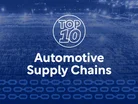
Automotive companies pride themselves on their manufacturing supply chains, the lifeblood of their efforts to build vehicles, quickly and to the highest standards.
Since Henry Ford's conception of the assembly line through the Model-T production paved the way for mass production, and was the creation point of the size and scale of supply chains we see today across the automotive industry.
Of course, Ford remains one of the biggest players in the industry and makes this list nearly a century on.
This list considers each company's vehicle output and revenue to assess the scale of their supply chains.
Here, Supply Chain Digital takes a look at the top 10 Automotive Supply Chains.
10. Hyundai
Founded: 1967
Employees: 313,949
CEO: Jae Hoon Chang
Revenue: US$125.6bn
Output: 4.2 million vehicles
The Hyundai Motor Group spans household names including Hyundai, Kia and Ioniq.
They have partnered with AWS to accelerate the digitisation of their manufacturing and supply chain operations, utilising their cloud offerings across GenAI, storage and database management.
9. Honda
Founded: 1948
Employees: 197,039
CEO: Toshihiro Mi
Revenue: US$136.43bn
Output: 4.19 million vehicles
Based in Japan, Honda manufactures both cars and motorcycles.
It leverages technological advancements to forecast demand and monitor shipments in real-time, ensuring a streamlined supply chain through the Just-In-Time approach.
8. Mercedes-Benz
Founded: 1926
Employees: 166,056
CEO: Ola Källenius
Revenue: US$164.4bn
Output: 2 million vehicles
Mercedez-Benz Group AG includes the Mercedez-Benz range and Smart brands.
They have prioritised a regional approach to sourcing and have partnered with Microsoft to ensure top-end and electric vehicles are prioritised in the supply chain.
7. BMW
Founded: 1916
Employees: 155,000
CEO: Oliver Zipse
Revenue: US$167.1bn
Output: 2.555 million vehicles
The BMW Group produces the BMW, Mini, and Rolls-Royce brands.
In order to improve efficiency and cut costs within the supply chain it adopts a strategy in which multiple vehicle models share common components – meaning both parts and production processes are interchangeable.
6. GM
Founded: 1908
Employees: 163,000
CEO: Mary Barra
Revenue: US$171.8bn
Output: 6.2 million vehicles
The General Motor Company brand spans Chevrolet, Cadillac, Buick and GMC.
They are prioritising the development of a leaner supply chain model and opened their first exclusively electric vehicle assembly plant in 2021 as part of their commitment to become carbon neutral by 2040.
5. Ford
Founded: 1903
Employees: 177,000
CEO: Jim Farley
Revenue: US$176bn
Output: 4.4 million vehicles
Since pioneering the assembly line, Ford have adapted their model to minimise wastage and prioritise inventory management so now operate the Just-In-Time model.
The group includes the vast Ford range, as well as the luxury Lincoln brand.
4. Stellantis
Founded: 2021
Employees: 258,275
CEO: Carlos Tavares
Revenue: US$$203.4bn
Output: 6.16 million vehicles
Stellantis' rapid growth is grounded in its legacy brands from Vauxhall and Jeep to Maserati.
They have ambitious climate targets, including achieving net zero by 2038 and already include climate requirements in their purchasing agreements.
3. RNM
Founded: 1999
Employees: 375,000
Chairman: Jean-Dominique Senard
Revenue: US$275.9bn
Output: 6.5 million vehicles
The Renault-Nissan-Mitsubishi Alliance leverages the skills of its most experienced partners and shares its range of assets, meaning neither company is forced to redevelop anything from scratch.
This reduces costs and increases performance and innovation across the alliance. The Mitsubishi Group contributes to the majority of the alliance’s revenue at $141.17 bn, followed by Nissan at $78.41 bn USD and Renault at US$56.34bn.
2. Toyota
Founded: 1937
Employees: 370,000
CEO: Kōji Satō
Revenue: US$298bn
Output: 9.52 million vehicles
The Toyota Motor Corporation's brands include their largest and most profitable brands, Toyota and Lexus, as well as two smaller Japanese brands, Daihatsu and Hino.
Toyota developed the Just-In-Time supply chain model which has been adopted by many other global corporations and ensures only the specific quantities and types of items needed are released into the assembly line when they are needed.
1. Volkswagen
Founded: 1937
CEO: Oliver Blume
Employees: 676,000
Revenue: US$356.71bn
Output: 9.24m vehicles
The Volkswagen Group takes the top spot, with brands stretching from VW and Skoda to Bentley and Porsche.
They are working towards a “completely digitised supply chain” to “safeguard supply and leverage synergies” across the Group.
Vokswagen operates a Responsible Supply Chain System (ReSC) which, on top of standard risk analysis and supplier checks, operates the Human Rights Focus System and the Raw Materials Due Diligence Management System.
******
Check out the latest edition of Supply Chain Magazine and sign up to our global conference series – Procurement and SupplyChain LIVE 2024.
******
Supply Chain Digital is a BizClik brand.




